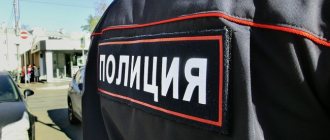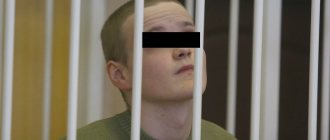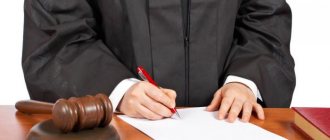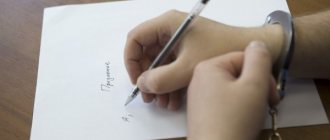The procedure for questioning persons present at the scene of the incident is regulated by Art. 278 Code of Criminal Procedure. Minors are interviewed in accordance with the instructions contained in Art. 191 Code of Criminal Procedure. The evidence received, as well as information about the witness, the person interrogating him and other participants in the process are entered into the protocol.
Since May 2007, its form has no established form and can be compiled in any form, including electronic (Part 2 of Article 474 of the Code of Criminal Procedure). The requirements for the content of the protocol are set out in Art. 190 Code of Criminal Procedure.
Types of witnesses
A witness is a person who may have information relevant to the case under investigation. Based on the type of information, interrogated persons are divided into:
- Eyewitnesses who directly observed the commission of a crime.
- Witnesses who have information that will help solve the case and relate to:
- criminal;
- weapons of crime;
- eyewitnesses;
- other circumstances.
Regarding participation in the incident, two groups of witnesses can be distinguished:
- Active ones who participated in the situation. For example, they tried to prevent an unlawful act, provided assistance in apprehending the criminal, and rescuing the victims.
- Passive, not interfering in the course of events:
- Due to one’s own indecision, fear of danger, at the request of loved ones.
- For lack of such an opportunity. For example, the incident was seen from the window of an apartment or a passing vehicle.
Persons not subject to interrogation
If information relating to a crime was obtained in the performance of official duties, the following persons are not subject to questioning as witnesses:
- judge;
- juror;
- defender;
- advocate;
- member of the Federation Council;
- State Duma deputy;
- priest.
Also, according to the Code of Criminal Procedure of the Russian Federation, a witness cannot be involved without his consent in giving evidence directed against himself or close relatives.
Rules for interrogation
The interrogation procedure is determined by Art. 278 Code of Criminal Procedure:
note
In investigative practice, the concepts of questioning and interrogation are distinguished. Thus, only witnesses to a crime, the accused and the victim can be summoned for questioning, and persons not involved in the criminal process can be questioned. Read more on our website here
- The witness testifies separately from other interrogated persons, especially from those persons who have already undergone the procedure.
- Before testifying, the witness:
- provides his personal information, relationship to the accused and the victim;
- is notified of its rights, obligations and penalties referred to in Art. 56 Code of Criminal Procedure;
- gives a subscription confirming familiarization with the specified rules.
- The party that applied for his summons has the right to question the witness first in court. The judge uses this right last.
- If it is necessary to ensure the integrity of a witness, as well as his relatives, personal information is not disclosed. Also, during the procedure, participants in the court hearing are deprived of the opportunity to see the interrogated person.
Who makes up
Carrying out all procedural activities is within the competence of law enforcement officials. Such persons are investigators tasked with investigating a specific criminal case.
To conduct questioning of witnesses, the investigator has the right to carry out the following actions:
- Carry out procedural measures aimed at identifying and searching for persons who have reliable information about any circumstances related to the crime;
- Call an unlimited number of people for interrogation;
- Repeatedly call witnesses to clarify previously given testimony;
- Draw up protocols based on the results of the interrogation.
Note! The investigator must perform all of these actions in strict accordance with the norms of the Code of Criminal Procedure of the Russian Federation. Violation of procedural norms will entail the exclusion of the interrogation protocol from evidence when considering a criminal case in court.
Article 51 of the Constitution of the Russian Federation and Article 56 of the Code of Criminal Procedure of the Russian Federation
Conducting the interrogation of a witness and drawing up a protocol must provide for compliance with the following mandatory requirements:
- Before starting this process, the witness must be explained the rights and obligations regulated by Art. 51 of the Constitution of the Russian Federation and Art. 56 Code of Criminal Procedure of the Russian Federation;
- The witness has the right to use the services of a defense lawyer, so refusing access to a lawyer will be illegal;
- After preparing the protocol, the witness must not only familiarize himself with the text of the document, but also certify with his personal signature each sheet of the protocol.
After the protocol is drawn up, it is included in the materials of the criminal case and will serve as evidence during the judicial investigation.
Witness interrogation protocol form
Completed sample witness interrogation protocol
What are the stages of the procedure?
Interrogation is carried out in the following sequence:
- Preparation.
- Establishing psychological contact.
- Free story from the interviewee.
- Revealing additional information from the interrogated person.
- Providing the witness with the protocol for review.
We will talk about the difference between the concepts of a witness and a witness in this article.
Preparing for interrogation
During interrogation, you need to adhere to pre-thought-out tactics designed to help obtain reliable information. The interrogated person is explained the procedure and the measures provided for refusing to answer questions and providing knowingly false information.
Making contact
A witness may resist the investigator or refuse to testify. It is advisable to conduct communication in a warm, confidential tone and express gratitude for assistance in the investigation. A warning about perjury should be unobtrusive and accompanied by an explanation of its formality.
If there are suspicions about concealment of information or its unreliability, the interviewee must be directly notified of responsibility for possible deviations from the truth. It is necessary to clarify that such violations also include false statements that the eyewitness did not see or does not remember certain circumstances. It is necessary to appeal to the best sides of his personality, to encourage him to fulfill his civic duty.
How should a free story proceed?
The interviewee presents his version of what happened in any order or according to the instructions of the investigator. During the story, it is not recommended to ask questions or comment on what you heard, so as not to confuse the witness.
What questions are asked of the witness?
Remember!
Punishment for perjury is determined by law - from a fine to imprisonment for up to 5 years (for a serious or especially serious crime). Read more about perjury in this article.
The purpose of the questions is to clarify certain points and fill in gaps in the story. Questions may concern additional information that is not directly related to the incident, but will help verify testimony and recall new facts. For this we use:
- Associative connections between forgotten and already told facts.
- Interviewing a witness at the scene. Re-exposure to the scene seen during the crime helps to recall missed moments.
- Repeated interrogation, which may reveal facts not yet known.
Familiarization with the protocol
At the end of the interrogation, the witness is provided with a protocol, the reading of which he confirms with his signature. At the same time, he has the right to make his comments and requests. For example, about the inclusion of drawings or diagrams drawn up by him in the protocol. The interviewee also gets acquainted with the audio recording of the interrogation. After which the protocol is signed by the person who performed the procedure.
Summary
Interrogating a minor citizen is a complex but necessary procedure to establish all the circumstances of the crime committed.
When talking with teenagers, you must comply with the strict interrogation requirements regulated by the legislation of the Russian Federation. If the rules are violated, witness testimony may be invalidated, which will complicate the consideration of the case in court.
In addition, the most important factor during interrogation is the psychological state of the child, therefore all investigative officers must have knowledge in the field of psychology so that children can trust justice and give truthful testimony.
Interrogation of a minor witness
Testimony is taken from minors taking into account their susceptibility to suggestion, tendency to exaggerate and embellish reality, as well as sharp emotional fluctuations. Lack of life experience can lead to a biased perception of the event that occurred and distortion of some of its fragments.
Where is the procedure performed?
When choosing a place for interrogation, you need to focus on the age of the minor, his character, and degree of intelligence. It is also necessary to identify persons influencing the teenager. It is better to interview children in the younger age group in their usual settings: in a classroom, kindergarten or at home. In the case of teenagers, on the contrary, a formal setting will help instill a sense of responsibility and obtain reliable information.
Features of the interrogation
Interviewing minors is regulated by Art. 191 Code of Criminal Procedure. These include persons:
- under sixteen years of age;
- over 16 years old, but:
- developmentally delayed;
- suffering from mental disorder.
Art. 191 of the Code of Criminal Procedure contains 5 points.
Paragraph 1
The interrogation of an imperfect witness is carried out in the obligatory presence of a teacher or psychologist. If the child has reached 16 years of age, the decision on this issue is left to the discretion of the investigator. The legal representative of the witness also has the right to participate in the procedure.
Duration of the survey.
| Witness age (years) | Maximum duration of interrogation | |
| Nonstop | In a day | |
| Less than 7 | 30 min | 1 hour |
| 7–14 | 1 hour | 2 hours |
| More than 14 | 2 hours | 4 hours |
Point 2
Persons under the age of 16 are not liable for refusal to answer questions or for providing knowingly incorrect information, which is why they are not warned about this before the procedure. The respondents are explained their rights and the need to provide truthful testimony.
Point 3
If the presence of a legal representative is contrary to the interests of the interrogated person, the investigator has the right to exclude him from the participants in the process. Instead, another representative of the minor is invited.
Point 4
When investigating a case concerning violation of the sexual integrity of a minor, the interrogation is carried out with the mandatory participation of a psychologist.
Point 5
During investigative actions, it is mandatory to use video materials attached to the case. The exception is when the person being questioned or his representative objects to the reproduction of the recordings.
How to behave during interrogation if you are called as a witness:
Can a witness receive a copy of the protocol?
One of the most controversial issues in legal practice is the possibility of a witness obtaining a copy of the interrogation protocol that was conducted with his participation. This need arises if law enforcement agencies intentionally delay the issuance of a procedural act on bringing a citizen as a suspect or accused in a criminal case, preferring to receive information from him as a witness.
There is not a single norm or article in the Code of Criminal Procedure of the Russian Federation that would oblige the investigator to provide copies of the interrogation protocol to the witness. Thus, directly applying for the document will most likely result in a refusal.
However, there are legal options to obtain a copy of this procedural document:
- If during the interrogation the witness exercised the right to defense, his lawyer has every right to familiarize himself with the materials of the criminal case and receive extracts and copies of procedural documents;
- Even if a lawyer did not participate in the interrogation, the witness has the right to hire a lawyer after drawing up a protocol, which allows access to the case materials.
Note! The powers of a lawyer in defending a criminal case can only be confirmed by a warrant. Consequently, only this document will enable the defense attorney to obtain a copy of the witness interrogation protocol.








